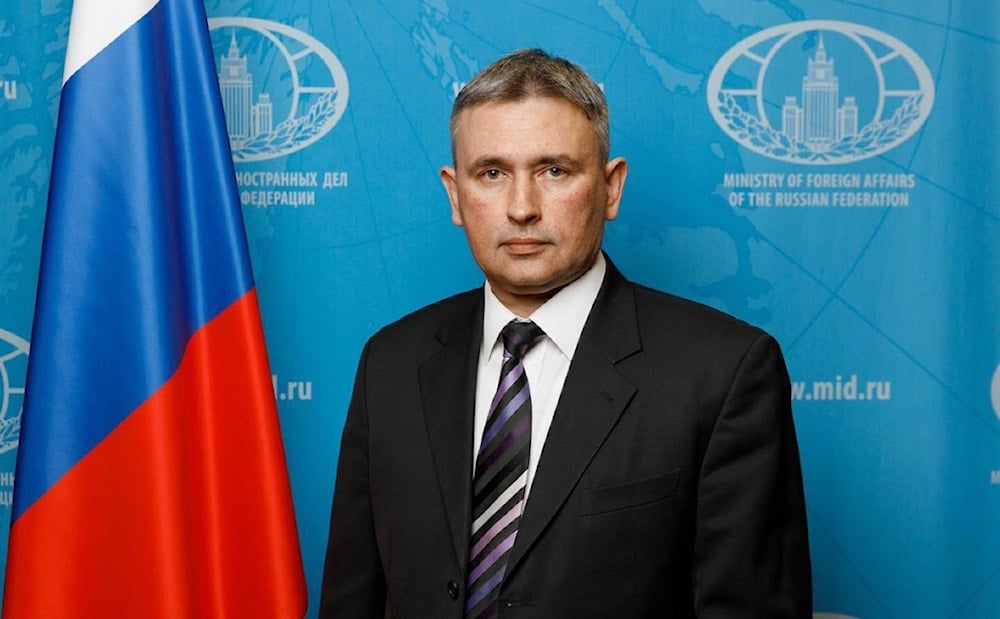Sudan the newest target of Western interests: Russian ambassador
The Russian ambassador to Sudan said that Moscow remains committed to supporting its allies globally, including in Africa, despite facing numerous obstacles.
-

The Ambassador of the Russian Federation to the Republic of Sudan, Chernovol Andrey Georgievich (File Photo)
The Ambassador of the Russian Federation to the Republic of Sudan, Chernovol Andrey Georgievich, affirmed in an article titled On Confronting Western Neo-Colonialism on afrinz.ru that "Sudan has become the next target of the collective West."
Georgievich gushes: "All the plans are already set: despite the failure of the “framework agreement” and the current conflict fuelled by its Western ideologues, paid activists from the fugitive foreign opposition Taqaddum must be brought to power in the country at any cost. Their force cover and political partner in the Addis Ababa agreement is the SIS (paramilitary organization “Rapid Reaction Force” – “AI”), 80% staffed by foreign mercenaries."
In Georgievich's view, the escalating crimes committed by militants, often and insincerely condemned by Western powers, actually benefit those pulling the strings. This provides them with a convenient pretext to dispose of these militants in the future. Blaming particular commanders and their supporters, ostracizing them, and seizing their assets is a centuries-old practice among colonial powers, he further stressed.
"At the same time, the United Nations track uses the schemes of international intervention under Chapter VI of the UN Charter under the pretext of preventing a humanitarian catastrophe, which had been worked out during the previous conflict in Darfur in 2003-2005. Such unscrupulous methods as falsifying statistics, twisting the statements of Sudanese officials, searching for and creating artificial obstacles to the delivery of humanitarian aid, etc., are being used," Georgievich outlined.
"What follows is an inevitable prolongation of the conflict with an influx of extremists from across the Sahel into Sudan. The final chord in the best American traditions should be “humanitarian bombardment” of the hotbeds of international terrorism, following the example of Fallujah, Raqqa and Mosul, where tens of thousands of civilians died and ISIS* was never defeated," he further said.
The Russian ambassador to Sudan affirmed that Moscow remains committed to supporting its allies globally, including in Africa, despite facing numerous obstacles. He further noted that people across the African continent are becoming increasingly aware of the true intentions behind Western aid efforts.
The ambassador stressed that Russia believes its Sudanese allies have the capacity to independently resolve their internal differences, preserve their state, initiate inclusive dialogue within Sudan, unite around common national interests, and achieve success. Georgievich concluded by reiterating Moscow's readiness to assist in any way possible to stabilize the situation and restore peace in Sudan.
Sudan faces severe water crisis amid war, soaring temperatures
War, climate change, and man-made shortages have plunged Sudan into a severe water crisis, adding to the nation’s existing struggles.
In the scorching heat, with temperatures exceeding 40 degrees Celsius (104 degrees Fahrenheit), 65,000 residents of the Sortoni displacement camp endure the impact of the ongoing conflict between Sudan's army and the paramilitary Rapid Support Forces (RSF).
When the conflict erupted over a year ago, most foreign aid organizations, including the one operating Sortoni's local water station, had to cease operations, leaving residents to fend for themselves.
Despite its abundant water sources, including the Nile River, Sudan has long struggled with water scarcity. According to the United Nations, before the war, a quarter of the population already had to walk over 50 minutes to access water.
Now, from Darfur’s western deserts through the fertile Nile Valley to the Red Sea coast, the water crisis affects 48 million Sudanese.
In North Darfur’s capital, el-Fasher, besieged by RSF, deadly clashes threaten water access for over 800,000 civilians.
Just outside the city, fighting over the Golo water reservoir "risks cutting off safe and adequate water for about 270,000 people," the UN children's agency UNICEF has warned.
UNICEF has warned that fighting over the Golo water reservoir just outside el-Fasher "risks cutting off safe and adequate water for about 270,000 people."
The UN Security Council has demanded an end to the siege of el-Fasher.
A European diplomat with extensive experience in Sudan’s water sector warned that if RSF doesn't allow fuel to enter the city, the water stations will stop working.
"For a large part of the population, there will simply be no water," he told AFP.
In Khartoum, located at the meeting point of the Blue Nile and White Nile rivers, residents suffer from a lack of water. The Soba water station, a key supplier for the capital, has been out of service since the war broke out, a local volunteer indicated.
He pointed out that people have had to buy untreated "water off of animal-drawn carts, which they can hardly afford and exposes them to diseases."
Another local volunteer told AFP that entire neighborhoods in Khartoum North have been without drinking water for a year.
"People wanted to stay in their homes, even through the fighting, but they couldn't last without water," he said.
Hundreds of thousands have fled to Port Sudan on the Red Sea, which also faces a major water crisis. The city relies on a single inadequate reservoir, and the influx of displaced people has exacerbated the problem.
Cholera cases have surged, with nearly 11,000 recorded between April 2023 and March 2024, as per Health Ministry data, and the outbreak comes with the majority of Sudan's hospitals shut down.
Read more: Darfur city's last hospital forced to shut down amid intense fighting

 5 Min Read
5 Min Read








